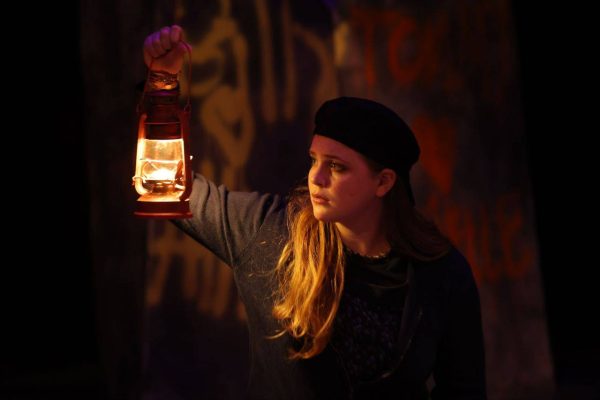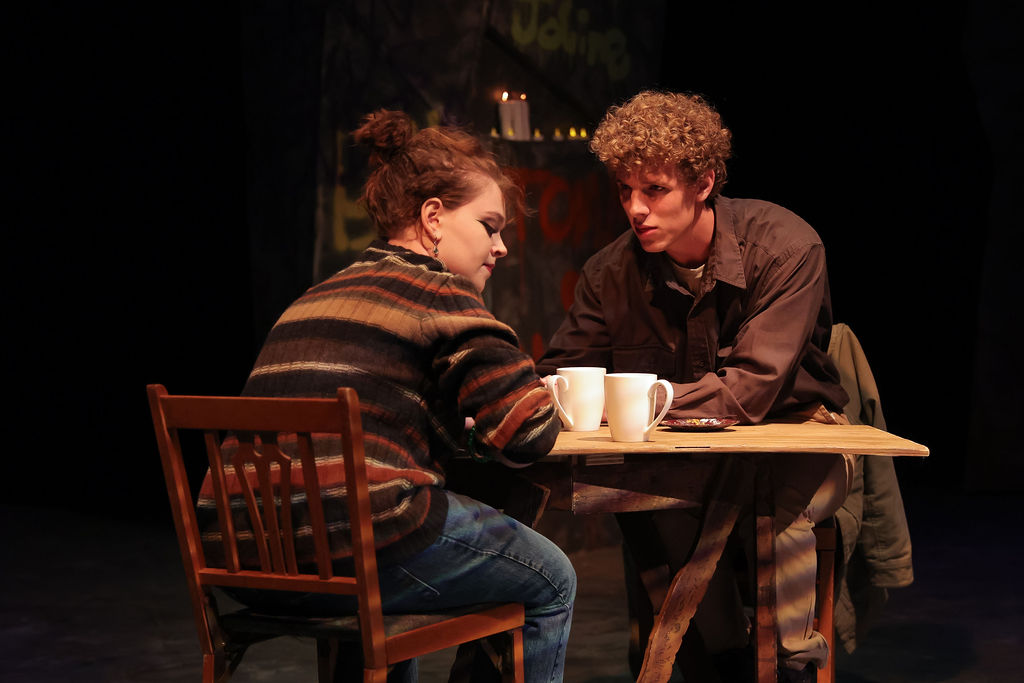On Tuesday, Oct. 8, Furman Theatre opened “Language of Angels,” a play written by Naomi Iizuka that first debuted in 2000. Inspired by her cultural background, Iizuka uses Japanese ghost story playwriting techniques to explore the many ways people experience grief. She leverages the plot structure of a Noh, a traditional Japanese dramatic form, to articulate the pain of sudden loss. While the play’s title could easily be that of a celestial fairytale, the plot is hauntingly realistic in a supernatural way.
The play begins with Seth (played by Emma Turgeon ‘28) surrounded by cave-like darkness with only a single lamp illuminating her face. As she describes the horrors of getting lost in the caves the play centers around, angelic singing echoes through the theatre. The combination of the light, signified by the angelic singing, and the dark, signified by both the literal darkness and the eeriness of the caves, sets the tone for the rest of the show.
The rest of the play dives into the different characters’ connections to Celie (Isabelle Seward ‘28), who went missing in the caves after a night of partying.
For Celie’s girlfriend, Seth, her memory is saturated with grief and a light of hope she keeps chasing through the caves but can never reach as she relives that night over and over in her mind. No matter how much she retells Celie’s story, she will never know how it really ended.
However, for JB (Hobbs Chambers ‘28), Celie lives on, not as an angel, but as a vengeful ghost, punishing him for murdering her without clear reason. What happened between the two of them that night remains a mystery, but Celie’s spirit makes him pay by burning messages into his back for the rest of his life.
Celie’s friend Danielle (Annie Dykstra ‘26) is the only one able to balance her grief with the need to move forward, and to live in harmony with Celie’s spirit. She seems comfortable with loss and grief, having also lost her boyfriend, Tommy (Seth Milton Jones ‘25). She later has a celestial encounter with him via a stranger named Michael, also played by Jones, who has an uncanny similarity to Tommy. Her previous supernatural encounter is what allows her to communicate with Celie, neither optimistic nor tortured about her disappearance.

We never get clear answers about what really happened to Celie, only cryptic clues about her fascination with angels and the afterlife. This lack of closure about Celie’s story reflects the confusion and emptiness one may feel while grieving.
Similarly, the play ends eerily and abruptly, which serves as a metaphor for Celie’s death. The unanticipated ending further brings the audience into the story, as they can empathize with the characters in their lack of closure.
The unique configuration of Furman’s thrust stage allows for the overall storytelling to be more intimate as the audience sees the characters’ grief up close, reminiscent of sharing personal stories around a campfire. The arrangement of the stage and set allows for the poignant message of the play to be experienced in a physical way, almost as if the audience is participating in the story. It also adds to the mystery of the performance, as not every moment can be fully seen by every audience member.
The costume design of the show helps to deepen the juxtaposition of light and dark. While the play’s title suggests a lighter theme, the costumes emphasize an ominous undertone. For example, in the flashback scenes where the events surrounding Celie’s death take place, the characters wear red and black clothing nostalgic of the late ‘80s and early ‘90s. Notably, Celie is dressed in all red, possibly alluding to her sinister demise and highlighting her prominence in the other characters’ lives even after death.
Despite the many rehearsal hours lost due to the impact of Hurricane Helene, the cast and crew of “Language of Angels” were able to share a mystifying yet thoughtful performance about the aftermath of loss and the unique ways people feel and bear the weight of grief.




































